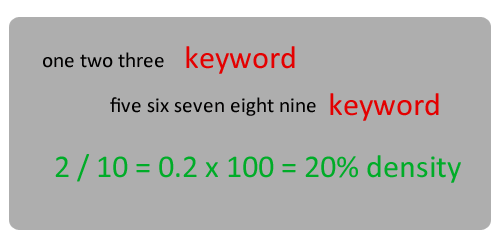Keyword density and SEO, how the relationship has changed. Years ago, when the Internet was young and the search engines less sophisticated, a website designer or owner could simply put up a site and load it with keywords. The site didn’t even have to be exactly relevant to those keywords, just enough to make it plausible. But now, Google and Bing have gotten wiser, more sophisticated and more proactive. Not only do the search engines weed out sites with keyword spam, but sites which over optimize. All of these measures are being implemented because that’s what their customers expect–to find the most relevant, natural content. So, the relationship between keyword density and SEO is changing to meet consumer demand.

What is Keyword Density?
It used to be relying on a reputable keyword density checker would be enough to optimize content. But this too is fast changing. There are other factors which outweigh keywording. This is not to say that keyword research is passe, because it isn’t. However, it is to say that what you’ve always heard about keyword density and SEO probably isn’t true. You’ve likely been told, read and seen that keyword density and SEO are inseparable components. But that model is undergoing a shift.
Just a few years ago, keywords were seen as a sure-fire way to get higher search rankings. Website designers, SEOers and site owners went through one keyword tool after another, trying to achieve stratospheric results. The rule of thumb for keyword density was about 3 to 5 percent. Now, the metric is much lower. Even pages with 1 percent or less KW density attain high rankings.
Which Keyword Tool Works Best?
As stated, using a keyword tool isn’t going to give anyone a complete picture of the SEO landscape. But it’s still useful in targeting a specific audience. Believe it or not, the best keyword tool is just writing with the intended audience in mind: so say Google’s Matt Cutts and Bing’s Duane Forrester. In fact, Mr. Cutts goes so far as to say that a site can’t be a “brochure” and sprinkling in keywords people actually search for will get results. Here’s a few other tips for best use of keywording and creating a site which will rank high:
- Fill the site with more than a biography, mission statement and company profile language. If someone is searching for a plumber, they’re far more likely to trust and return to a site which as video or written tutorials.
- Write content that covers the bases. If your site is about dog training, it stands to reason people will also search for canine behavior, dog obedience, puppy rearing, et cetera.
- Don’t rely on the META Keywords tag. It is no longer relevant to Google, and Bing is only using it to identify spammy sites.
- Think outside the box. Look at competitor sites and create an element they’re all missing. Keep it relevant and make it useful to visitors, otherwise it’ll be an exercise in futility.
If you want to get your site to rank higher with the search engines, then contact us for a free, expert consultation. We’ll be happy to discuss how it is our SEO clients are getting more visitors and increase conversion rates.

